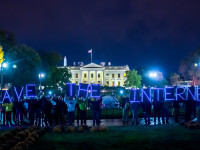One of President Barack Obama’s selling points for the TPP has been claims that it helps preserve “an open and free Internet.” The references to an open and free Internet, which is closely linked to net neutrality, may strike a chord with those concerned with digital issues. However, the Trouble with the TPP is that a close examination of the text and a comparison with existing net neutrality rules in many TPP countries reveals that it doesn’t advance the issue. In fact, the standards are so weak and unenforceable that at least half of the TPP countries already far exceed them.
Article 14.10 of the TPP provides:
Subject to applicable policies, laws and regulations, the Parties recognise the benefits of consumers in their territories having the ability to:
(a) access and use services and applications of a consumer’s choice available on the Internet, subject to reasonable network management;
(b) connect the end-user devices of a consumer’s choice to the Internet, provided that such devices do not harm the network; and
(c) access information on the network management practices of a consumer’s Internet access service supplier.
As a starting point, this is not mandated obligation. The TPP countries merely “recognize” the benefits of some net neutrality provisions. For those countries without net neutrality rules, there is no requirement to implement anything in order to comply with the agreement. In fact, if there was any doubt about the lack of enforceability, the entire provision is prefaced by the reference to “subject to applicable policies, and regulations.” In other words, the provision doesn’t advance anything for countries without net neutrality provisions.










